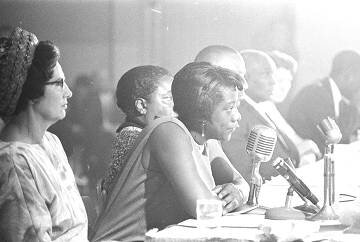Blackwell v. Issaquena Board of Education
Reading by Dawn Keene
“Change depends on people knowing the truth. Change depends on people speaking that truth out loud. That’s what movements do. Movements educate people to the truth… Movements are the way ordinary people get more freedom and justice.”
Unita Blackwell, Barefootin’: Life Lessons from the Road to Freedom (2006)
On April 1, 1965, the civil rights suit of Blackwell v. Issaquena Board of Education was filed on behalf of 300 African-American students from several schools across Issaquena County in Mississippi. The students were suspended for wearing and distributing “freedom” buttons after school administrators forbade them. The buttons were from the youth led civil rights organization, the Student Nonviolent Coordinating Committee (SNCC).
In the days prior to the suspensions, students began wearing the SNCC pins that depicted a black and white hand joined in unity. SNCC had been organizing a grassroots community effort to register more African Americans to vote in the county. After the students were forbidden to wear or distribute the pins, the students continued to stage protests and boycotts. Many disobeyed the orders to stop wearing the pins which led to the suspensions.
So many kids came to school wearing SNCC pins that we couldn’t count them all. The principal began the day by calling a general assembly. He said that he would listen to no more questions. Then he read from a book a rule saying that, “Any student who disrupts school can be suspended or expelled by the principal.” He told the students that the SNCC pins were disrupting school. Any student who wore a pin the next day would be suspended, and any student who wore a SNCC pin on Thursday, said the principal, would be expelled and not allowed to go to school anywhere in Mississippi. — Student
As the students see it, the only people being disrupted by the SNCC buttons are the school authorities and it’s not the pins causing disruption, it’s the effort to deny them their freedom. Few of those wearing freedom buttons take them off. [From CRMvet.org]
Unita Blackwell
Unita Blackwell, a SNCC field officer and mother to one of the students, decided to launch a legal case in which her husband and son were the plaintiffs. They argued that the schools had violated the students’ First Amendment rights to free speech and political expression of ideas that challenged the racial injustice of the school system. They wanted all suspended students to be allowed to return to school and for the schools to allow students the freedom to wear the SNCC pins. They also demanded that the Issaquena schools implement the Supreme Court ruling of desegregation by the beginning of the 1965 school year.
The federal courts sided with the school board’s disciplinary action of censorship and suspension. They stated that the school’s interest in preventing the interference with school policies trumped the students’ rights of free speech. On the other hand, the court sided with the Blackwells on the need for a desegregation plan for the school district.
It would take another five years for the integration of the schools in Issaquena. Many students and their families continued to boycott the schools because of the court’s ruling. Blackwell, with the support of parents and the local SNCC chapter, offered an alternative form of education in a Freedom School.
Blackwell would continue to challenge racial injustice, championing civil rights in her community long after the court case. In Mississippi, she would become a community improvement leader for the National Council of Negro Women (NCNW) and later become Mississippi’s first African-American woman mayor in 1976.
Read more at CRMvet.org about the court case and the Issaquena County School Boycott.

